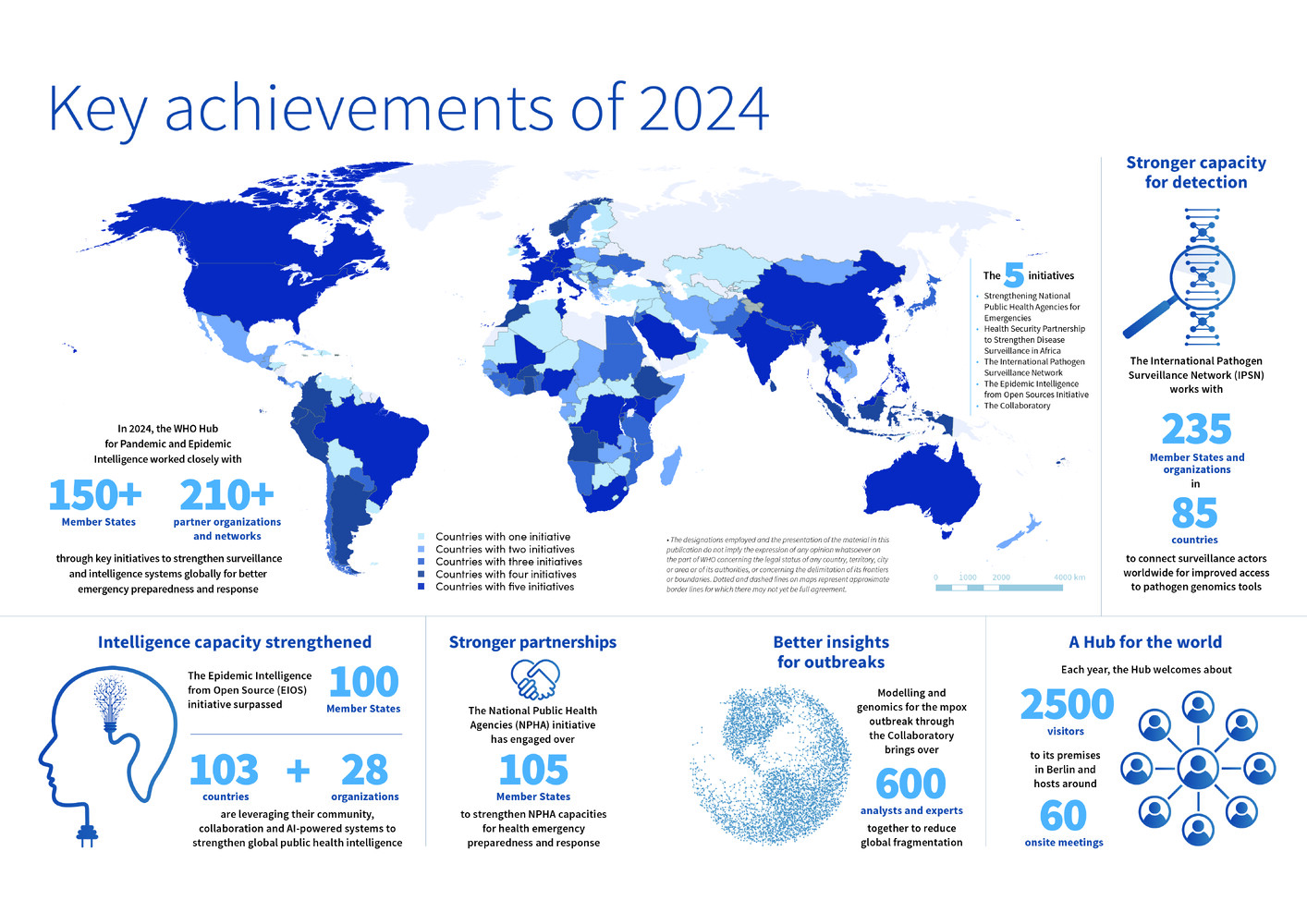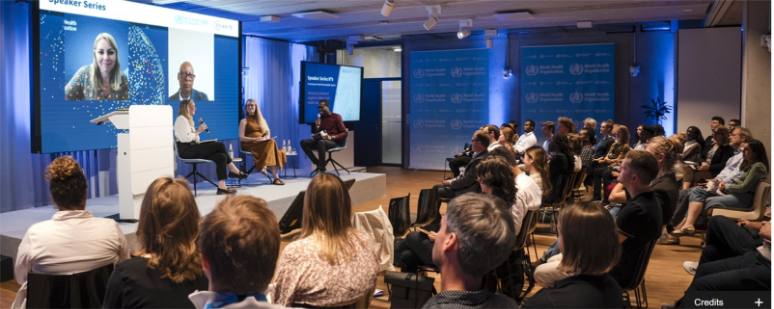Four years ago today, on 1 September 2021, WHO Director-General Dr Tedros Adhanom Ghebreyesus and then German Chancellor Dr Angela Merkel, established the WHO Hub for Pandemic and Epidemic Intelligence in Berlin.
Born out of the COVID-19 pandemic, the WHO Hub was created to transform the way the world detects, prepares for and responds to health threats. Four years on, it has become a cornerstone of WHO’s public health surveillance efforts, advancing the global implementation of the latest data science, artificial intelligence, and laboratory detection for a safer, healthier future.
Collaborative Surveillance: From vision to adoption
A cornerstone of the WHO Hub is the vision of Collaborative Surveillance, where countries and communities are empowered to work together with the latest technologies to minimize the impacts of pandemic and epidemic threats. Recent pandemics and other disease outbreaks have shown that in our interconnected world, no single sector or country can tackle public health threats alone. Collaborative Surveillance is a smarter, faster and more connected way to detect and respond to health risks. This approach brings together data insights from laboratories, hospitals, climate data, mobility trends, and beyond to give decision-makers the best possible data about emerging health threats.
Collaborative Surveillance has remained the guiding principle of our work, rooted in the belief that only by working together can the world better prepare for the next global health emergency. Collaborative Surveillance is now referenced in major international policy discussions, including the Pandemic Accord negotiations and G7 initiatives, and is shaping how countries invest in public health surveillance capacities. International partners and philanthropies, including the Gates Foundation, Rockefeller Foundation, CEPI, the Global Fund and the International Association of National Public Health Institutes have also embraced this approach, helping to embed it in the global health architecture.
Scaling up key initiatives

Over the last four years, the WHO Hub has established a number of key initiatives and projects that drive forward our mission to support Member States in detecting risks earlier, fostering collaboration in data sharing and joint analysis, and enhancing decision-making. As of now, the WHO Hub works with over 150 Member States and 210 partner organizations. Over the last four years we have expanded our portfolio:
- The Epidemic Intelligence from Open Sources (EIOS) initiative is now used by 110 Member States and 30 organizations, using community collaboration and artificial intelligence to improve real-time detection by continuously scanning open sources for health threats.
- The International Pathogen Surveillance Network (IPSN) connects 350 partners in 100 countries, with a US$ 4 million catalytic grant fund to strengthen pathogen genomics surveillance in low- and middle-income countries.
- The Collaboratory connects more than 1200 analysts and data scientists from over 100 institutions in more than 60 countries and promotes global collaboration on outbreak analytics.
- The National Public Health Agencies (NPHAs) initiative supports more than 105 Member States in strengthening national preparedness and response capacities through tailored support and collaboration.
- The Decision Support Simulator for Epidemics and Pandemics is on track to become a powerful tool, that will support policymakers in their decision-making by modelling disease transmission and the impact of interventions.
- Our GOARN Fellowship, jointly run with the Robert Koch Institute and GOARN - Global Outbreak Alert and Response Network, offers public health professionals the opportunity to develop specialized skills, work on impactful projects, and benefit from mentorship from top experts. Our Research Fellowship in Public Health Intelligence launched together with the Charité - Universitätsmedizin Berlin Center for Global Health is strengthening research in public health intelligence and closely aligns academic research with the most pressing current public health needs.
Anchored in Germany’s global health leadership
Germany has long been a leader in global health, from launching the G20 global health working group in 2017, to establishing the Global Health Hub Germany in 2019, and adopting its Global Health Strategy in 2020. This strong commitment made Germany a natural home for the WHO Hub. As then Federal Minister of Health Professor Dr Karl Lauterbach said at the World Health Summit 2024: “The WHO Hub for Pandemic and Epidemic Intelligence, supported by Germany and based in Berlin, is at the heart of our efforts to support the best science upon which to base sound, equitable and effective policies that will protect people around the globe.”
Over the years, our work with the WHO Hub’s foundational partners, the Robert Koch Institute and the Charité - Universitätsmedizin Berlin Center for Global Health has grown into a strong partnership working together on projects ranging from outbreak analytics to antimicrobial resistance, genomic surveillance, as well as academic research prioritization and fellowship. Our partnership strengthens Germany’s role as a thought leader in global health and attracts additional investment and recognition, creating multiplier effects for both global health security and Germany’s priorities.
A hub for collaboration
With more than 60 on-site events and 2500 visitors each year, the WHO Hub in Berlin has become a global campus that drives innovation in public health intelligence. Our workforce has grown to more than 100 people, including WHO staff, secondees, and experts from Member States and partner organizations.
The Hub’s Speaker Series, co-hosted with the Charité Center for Global Health, and the Pandemic and Epidemic Intelligence Innovation Forum are providing physical and digital spaces for the global public health intelligence community to connect and share experiences and successes.

Looking ahead
As we enter our fifth year, the world continues to face complex and intersecting threats: new and re-emerging pathogens, driven by climate change, conflicts and natural hazard emergencies. At a time when multilateralism is under attack, the WHO Hub is a strong example of how countries can come together and find common ground.
As we look to the future, the WHO Hub remains committed to driving innovation, fostering collaboration, and building the intelligence systems that will protect generations to come.
None of our progress would have been possible without the steadfast commitment of our Member States and partners worldwide. We remain deeply grateful to the Government of Germany and the German people for their trust in our work and their support. Thank you to all the teams at the Federal Ministry of Health who played a key role in this joint success. We look forward to continuing our collaboration with Minister Nina Warken and everyone at the Bundesministerium für Gesundheit. Together, we will keep building the capacities, trust and innovation needed for a safer and healthier world.
